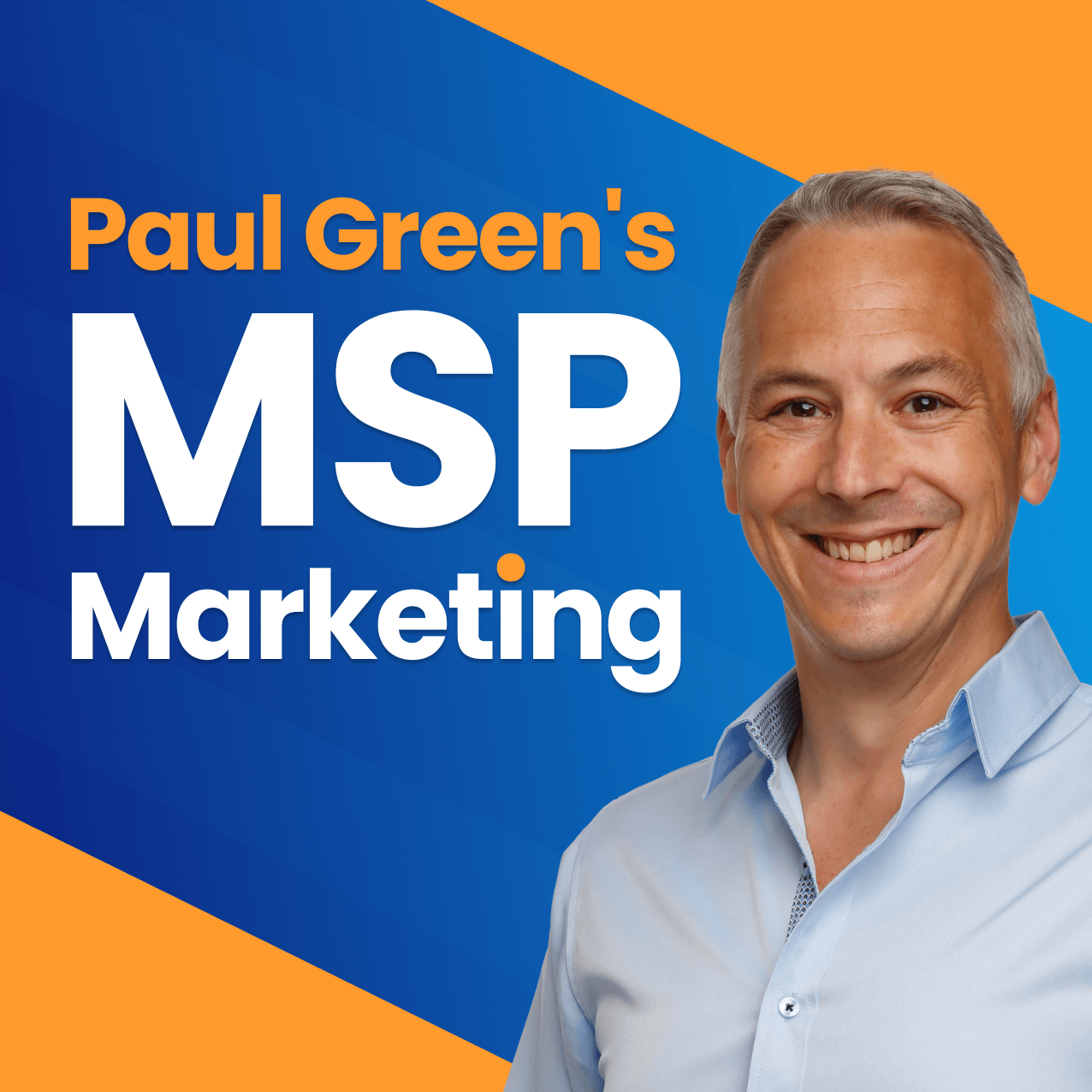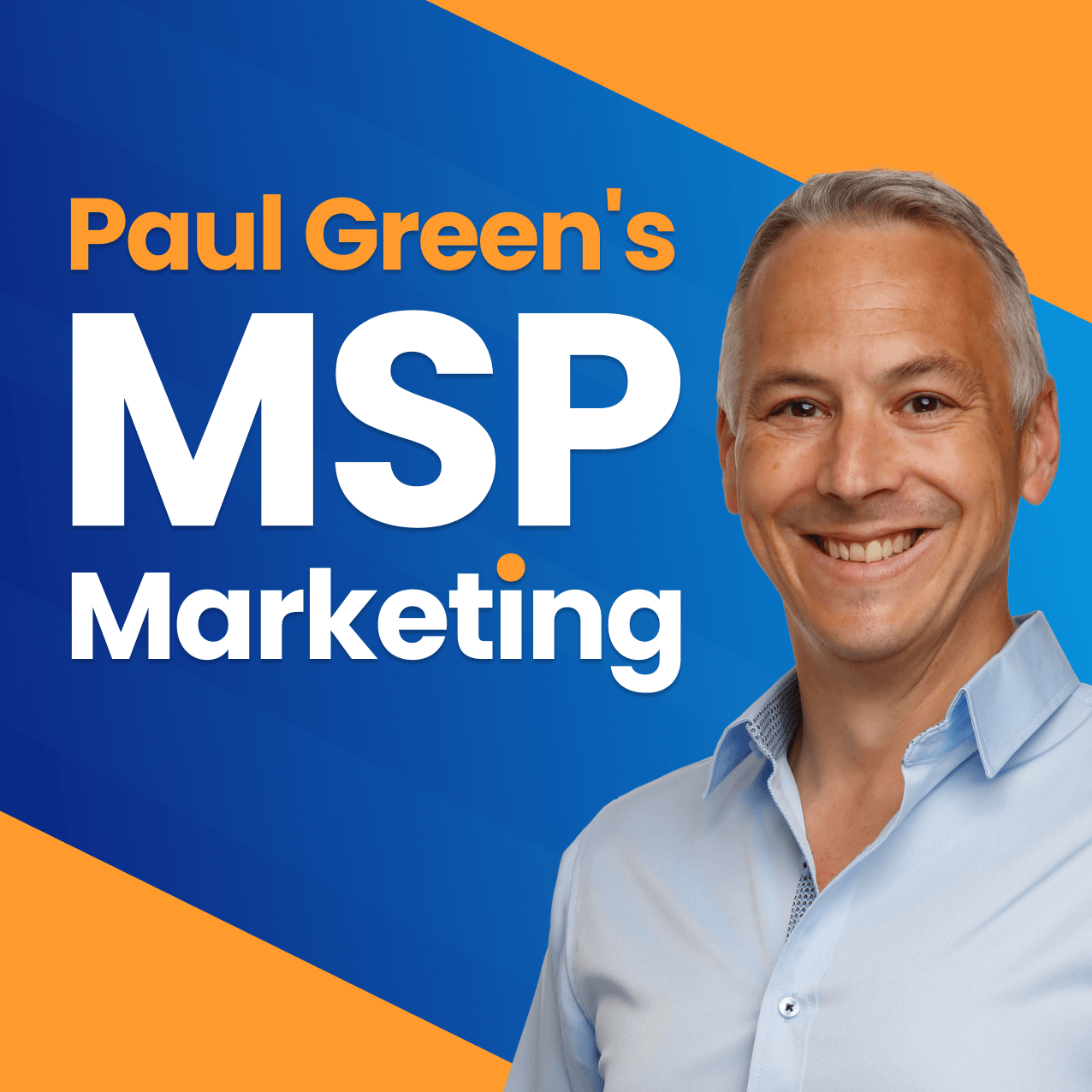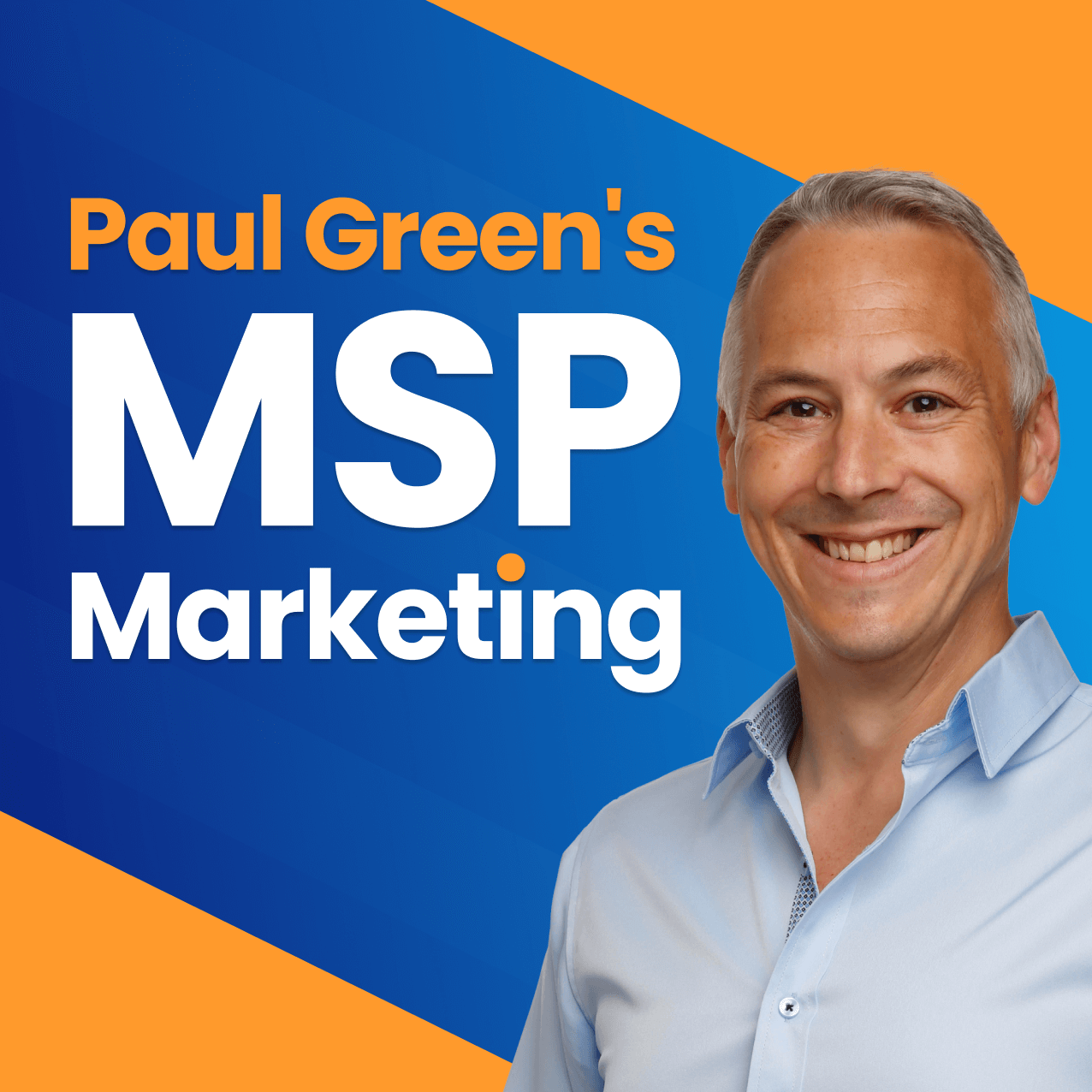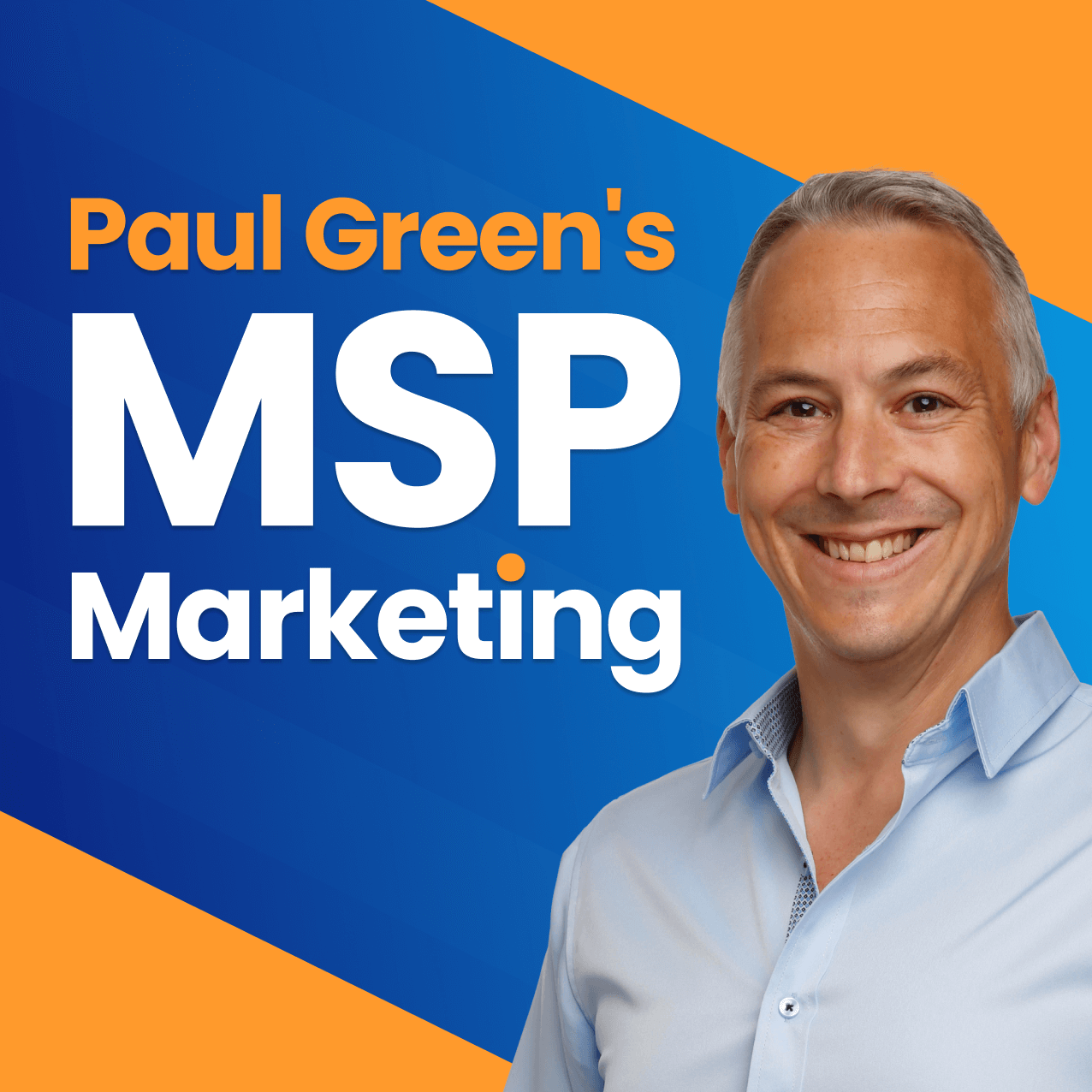They want to buy 365 direct – fight it, or accept it?
Description
The podcast powered by the MSP Marketing Edge
Welcome to Episode 291 of the MSP Marketing Podcast with me, Paul Green. This week…
- They want to buy 365 direct – fight it, or accept it?: If a client wants to buy 365 direct, it’s not necessarily a bad thing… it could actually become a massive sales opportunity for your MSP.
- Should your MSP start a podcast?: Lots of MSPs have asked me for advice on setting up a podcast, and yes, having a podcast can be an insanely powerful marketing tool. But should you do one? Let me help you answer that question.
- Ask these questions to pick an MSP marketing agency: Many MSPs hate marketing and they hate agencies even more. My guest is going to tell you the specific questions you should ask a marketing agency to separate the good guys from the bad.
- Paul’s Personal Peer Group: Have you ever considered sending an impact box to prospects? Find out what you should include in yours.
They want to buy 365 direct – fight it, or accept it?
Are these clients for real? They want to switch to buying 365 directly to save a couple of bucks a month. This is a scenario most MSPs face at some point, but should you fight it, try and educate them or let them just do what they want? What if I told you this wasn’t necessarily a bad thing and could actually become a massive sales opportunity for your MSP.
As someone who doesn’t personally have to deal with 365 and all the licenses and NCE and all of that, it does look to me like Microsoft has made it as hard as possible for you. That whole NCE thing is a massive pain, right? And especially if you have a client where you’ve made an annual commitment and then of course they hit you a few months in that they want to buy directly, and that just creates a headache for everybody.
It’s not like 365 is a high margin item for you, but from the client’s point of view, 365 is right there at the core of their experience.
Outlook and Teams and Word and Excel, these are all applications that most businesses use multiple times every single workday. So they want them to work, they want them to be productivity tools, not pains in the backside tools, and I think that’s a basic and perfectly understandable requirement of any business owner or manager today. Don’t you agree? So if someone wants to move the licenses away from you, buy direct and save themselves a couple of dollars per user per month, what should you do?
I’ve asked a few MSPs this question over the last couple of weeks and some of them have said that you should just roll over and you should just take it. So invoice them for any out-of-pocket expenses caused by NCE. Make sure they know how that’s going to affect the direct support that you give them and then let them go off and buy it from elsewhere.
Others have said that you should fight really hard to keep everything under your jurisdiction. Isn’t that the point of a managed service provider that you are looking after all of their technology? And that starts with the very basic help desk functions and goes right up to their technology strategy. Now if you don’t have some level of control over everything in between those two items. help desk and strategy, then surely you’re making your life harder than it needs to be and that must have an impact on the service that you can deliver to them and the service that they’ll enjoy.
So maybe the message you want to send them is telling them all the downsides, all the bad things that could happen, like the fact they’ll have to deal directly with Microsoft if there’s an issue. They’ll have to pick which license is best for them as well. Of course they’ll have to set up their new users, they’ll have to manage their users, deal with all of that headache. And of course it complicates your basic support or it could have an impact on some of the other work that you’re doing for them.
The challenge for you if a client asks this and you want to fight it, is to make them realise how much extra work they’re going to have to do for saving $2 per user per month. So to recap, some MSPs would roll over and say, here you go, other MSPs would fight it to keep it. To me there’s a third option and that’s to use this as an early warning of some potential future change in your relationship with your client. Because let’s be honest, this is just not a sensible decision that would be made by a sensible decision maker. Is it? It’s taking on a lot of extra work to save a tiny amount of money. And that rings an alarm bell for me.
Is your client desperately trying to cut costs? Does your client really not understand what you do for that $2 per user per month? Is your client actually thinking of switching to another MSP or doing something completely different and this is kind of your first notification of a very long process where at the end of it they’re going to leave and go to someone else. My suggestion is that if this happens to you, you don’t use this as an opportunity to go in and say stay or go. Instead, you use it as an opportunity to start a discussion to have an in-depth conversation about their business, where it’s going, what the goals are, what their issues might be, what are they facing at this very moment.
Very rarely are you as the MSP, the cause of some problems in their business, but you can become the victim of other problems that their business has. We’d always want to have a business discussion with someone before they made a major decision about doing something different, wouldn’t we? And this might just be the early warning that you would always want to receive. It’s actually quite cool to get it even if it does cause you a little bit of distress and of course some work. And do you know what, it might even lead to an upsell opportunity. Sometimes people cutting costs is a sign that they’re actually looking to spend more but in a different direction. So there might be some other services that you can sell them or you might be able to come up with a more comprehensive deal that helps them achieve the things that they want to achieve.
Now I would love to know what you think about this and did you know I have a Facebook group that’s all about discussing marketing and business growth and it’s a vendor free zone, only MSPs, no vendors. To join, go onto Facebook, type in MSP marketing in the search bar and then go to groups and you just look for the MSP marketing group. You’ve just got to prove that you’re an MSP by answering a few simple questions and I look forward to discussing this with you in that Facebook group.
Should your MSP start a podcast?
Have you ever heard me on my podcast and thought, that seems easy, I should do that? Lots of MSPs have asked me for advice on setting up a podcast, and yes, having a podcast can be an insanely powerful marketing tool. But should you do one? Let me help you answer that question, and if you do get started, let me tell you about these specific things you need to consider before you get started.
So Paul, should I do a podcast for my MSP? Well, my easy flippant answer to this is probably not, no. Because unless you have a real passion for podcasts and you’ve always itched to do your own, you’ll quickly find that a regular podcast is a total pain. However, the benefits are huge. I found that my podcast has been a key tool to reach people that I’d never have reached any other way.
It’s helped me set myself up as an authority figure. It’s helped me to open doors to influential people by interviewing them and it’s helped me to build a brand new audience. Would you and I be talking right now, either you listening on the podcast or watching me on YouTube, if I wasn’t doing this?
If you do fancy doing a podcast, these are the main 10 areas to consider.
The first is your target audience. Who are you going to do the podcast for? Now this is easy if you operate in a specific vertical, but much harder if you just operate geographically. You have to really ask yourself why would someone choose to listen to your podcast? What’s in it for them?
The second thing that kind of leads on from that is the podcast title. You need a unique title that will catch their attention. It also needs to be something that’s not already being done. And remember, ordinary people, the business owners and managers that you want to reach, they’re not as interested in technology as you are. So having a podcast about technology is probably not going to be interesting to the people you most want to reach, but they are interested in growing their business, increased productivity and just having a smoother, better run business.
Number three is regularity. So weekly gets people into the habit of listening. We’ve been doing it weekly since around about November 2019, but I’ll be honest with you it’s a treadmill, it really is. I work several weeks ahead, so I never miss an episode and that requires a lot of discipline. For example, right now I’m recording this on a Tuesday morning. It’s so sunny and beautiful outside I want to be out in my shorts working in the garden, but instead I’m in my studio and I’m recording the podcast because I need to do it now because my whole team is waiting for me to record that podcast so they can go and do the editing and the promotions and all the stuff they need to do. Discipline is a big thing with









